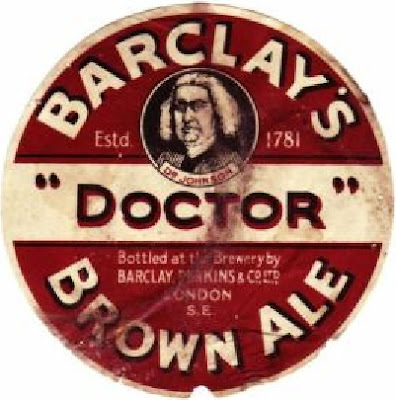Many of these beers resembled the Mild Ales of time, with gravities in the low-1040ºs. Others, like Whitbread’s Double Brown, were rather stronger, being over 1050º. Doctor Brown falls somewhere inbetween these gravities. Though that isn’t so obvious when looking at the brewing record. As brewed, Doctor Brown was 1040.8º. But the addition of primings added almost 6º to the effective OG.
There’s quite a lot going on in the recipe, mostly in the form of sugar. In the kettle, that was something described as “B.S.”, which I assume stands for brown sugar. The No.3 sugar represents the primings, which are simply described as “sweet”. I do know that they were a sugar solution with an OG of 1150º.
The grist is quite simple, consisting of just base malt, crystal malt and flaked maize. In case you’re wondering, that’s pretty different to their Mild Ale, which contained pale, mild, SA, amber and crystal malt. At this point some brewers were brewing Brown Ales very much as their own beer. Though I know from the absence of Brown Ales from many brewers’ records (even when I know that they sold one) that this wasn’t the case everywhere.
Four types of hops were employed: Mid-Kent Fuggles from the 1927 crop, Mid-Kent Goldings from 1926, Mid-Kent Bramling from 1925 and Pacific from 1922. All had been cold stored.
| 1928 Barclay Perkins Doctor Brown | ||
| pale malt | 5.25 lb | 55.85% |
| crystal malt 60 L | 1.00 lb | 10.64% |
| flaked maize | 1.25 lb | 13.30% |
| No. 3 invert sugar | 0.75 lb | 7.98% |
| brown sugar | 1.00 lb | 10.64% |
| caramel 2000 SRM | 0.15 lb | 1.60% |
| Cluster 135 mins | 0.50 oz | |
| Fuggles 75 mins | 0.75 oz | |
| Goldings 30 mins | 0.75 oz | |
| OG | 1046.5 | |
| FG | 1014 | |
| ABV | 4.30 | |
| Apparent attenuation | 69.89% | |
| IBU | 29 | |
| SRM | 26 | |
| Mash at | 153º F | |
| Sparge at | 168º F | |
| Boil time | 135 minutes | |
| pitching temp | 61.5º F | |
| Yeast | Wyeast 1099 Whitbread Ale | |

No comments:
Post a Comment